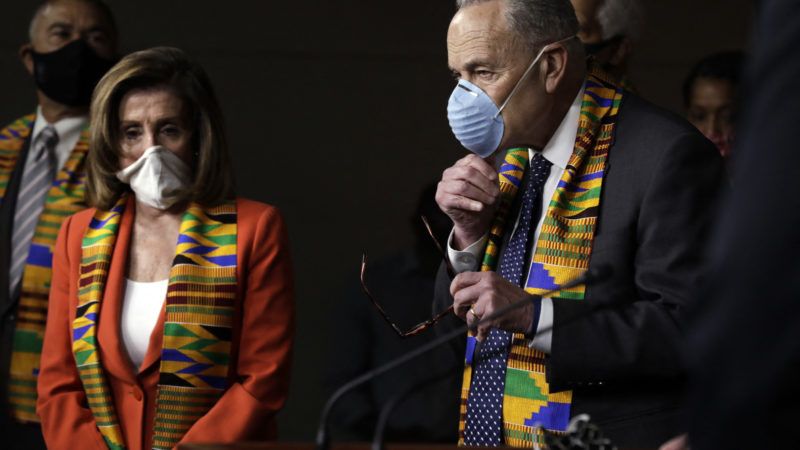House Passes Policing Reform Package, Including Provision That Would End Qualified Immunity
Republicans have said ending qualified immunity is off the table, and for the moment policing reform looks dead in Congress.

The Democrat-led House of Representatives passed a package of criminal justice legislation Thursday night, largely along party lines, to address nationwide protests and demands for policing reforms following the killing of George Floyd by a Minneapolis police officer last month.
By a 236-181 vote, with only three Republicans voting in favor of it, the House passed the George Floyd Justice in Policing Act. The legislation would end qualified immunity—a legal doctrine that shields cops from liability in civil rights lawsuits—establish a national registry for police misconduct, ban police chokeholds and no-knock raids in some circumstances, and limit the transfer of military equipment to state and local police departments. It would also require federal law enforcement officers to wear body cameras and to have dashboard cameras installed in their vehicles.
Ending qualified immunity has long been on criminal justice reform advocates and libertarians' wish lists.
"Qualified immunity is a failure as a matter of policy, as a matter of law, and as a matter of basic morality," said Robert McNamara, a senior attorney at the Institute for Justice, a libertarian-leaning public interest law firm. "For too long, qualified immunity has denied victims a remedy for violations of their constitutional rights. It's encouraging to see Congress is finally taking steps to fix this pernicious mistake by the Supreme Court."
Although civil liberties groups say the bill is far from perfect—they criticized provisions that would increase federal funding for state and local law enforcement—Kanya Bennett, senior legislative counsel at the American Civil Liberties Union (ACLU), said in a press release that tonight's vote is still "the most significant action that Congress has taken on police reform in the six years that have transpired between the deaths of Michael Brown in Ferguson and George Floyd in Minneapolis."
"Given this significant and historic moment we are in, though, Congress can and must do more," she continued. "We can't band-aid police with more federal dollars or take away just some of the military weapons. Congress must divest entirely from an institution that has brutalized Black people for centuries."
However, the fate of any comprehensive policing reform, at least at the federal level, seems doomed, at least for the moment. The White House and congressional Republicans have made it clear that ending qualified immunity is off the table.
Meanwhile in the Senate, Democrats have blocked Republican's more modest policing reform bill, the Just and Unifying Solutions to Invigorate Communities Everywhere (JUSTICE) Act, introduced by Sen. Tim Scott (R–S.C.).
The JUSTICE Act would, among other things, increase the penalties for filing a false police report and incentivize departments to create systems to share disciplinary records with each other to stop problem officers from being rehired. Another section, the Breonna Taylor Notification Act—named after a Louisville woman who was killed in a botched no-knock raid in March—would require states to collect and report data on the use of no-knock raids.
Democrats and civil liberties groups like the ACLU say Scott's legislation doesn't go nearly far enough in addressing systemic problems in American policing. Republicans, however, say their bill balances the need to address problematic policing while still supporting police overall.
"The American people know you do not really want progress on an issue if you block the Senate from taking it up," Senate majority leader Mitch McConnell (R–Ky.) said in a floor speech Thursday night. "They know that most police officers are brave and honorable and that most protesters are peaceful. And they know our country needs both."
For the moment, both parties are at an impasse. In a press release after tonight's vote, Rep. Doug Collins (R-Ga.), a member of the House Judiciary Committee, said Democrats' legislation is "just another thinly veiled Democrat attempt to look like they are getting something done when we all know this bill will never become law."
